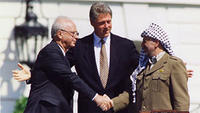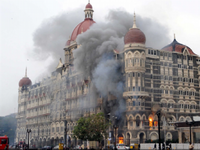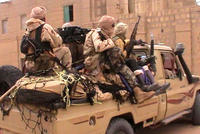-
UN includes Iran in drafting treaty aiming to stop arms proliferation to terrorists, rogue states

The UN Conference of the Arms Trade Treaty is tasked with drafting an international treaty aimed at stopping arms proliferation to terrorist groups and rogue states; the UN appoints Iran to be one of the vice presidents of the committee; the UN Watch watchdog groups says that appointing Iran to oversee the drafting of a treaty dealing with sending arms to terrorists “is like choosing Bernie Madoff to police fraud on the stock market”
-
-
Study: Islamist extremists emphasize self-defense, not world domination
A common belief in the West is that al Qaeda wishes to impose Islam everywhere; this might be a pipe dream for the group, but a new study of their use of religious texts suggests that Islamists’ goals are much more modest
-
-
Experts: If Arafat was poisoned, it was not by polonium-210
In a report last week, Al Jazeera claimed that the cause of Yasser Arafat death in 2004 was poisoning by the radioactive substance polonium-210, and that Swiss scientists found high concentrations of polonium in the cloths Arafat wore in his last days; experts say that the laws of physics make this theory impossible: Polonium-210 has a half-life of 138 days, meaning that half of the substance decays roughly every four-and-a-half months; since only miniscule amounts of the substance would suffice to kill someone, it is not possible that eight years after Arafat’s death, such high levels of the material would still be found in his belongings; put another way: for polonium-210 to be discovered today in Arafat’s clothing at such high levels would mean that such large quantities of the material had to be used – unnecessarily — eight years ago, that not only Arafat, but his entourage and many of the doctors, nurses, and patients at the Hôpital d’instruction des armées Percy where he was treated would be dead as well of radiation poisoning
-
-
Fort Hood incident report calls for sweeping changes in FBI’s approach

A report of the 2009 Fort Hood shooting will recommend eighteen specific changes which will make the FBI more likely to detect such insider threats earlier; the report, written by William Webster, the former director of the FBI, will be on the desk of Robert Mueller, the current FBI director, next week; the report’s authors focused on the FBI and the agency’s more than a hundred Joint Terrorism Task Forces (JTTFs) and how they handled and acted on counterterrorism intelligence before and after the shootings … and the FBI’s remedial measures in the aftermath of Fort Hood
-
-
Did Arafat die of radioactive poisoning?

When Yasser Arafat was taken seriously ill in October 2004, and then died in a Paris hospital the next month, many Palestinians charged that he was poisoned by the Israeli Mossad; his widow refused to permit an autopsy, so the poisoning theory could never be proved; now, Swiss scientists who examined items of clothing Arafat wore in his last days say these items contain a significant – and highly unusual – levels of polonium-210, a toxic radioactive material; the Russian secret service used polonium in 2006 to kill Alexander V. Litvinenko, a former KGB agent who became a critic of Putin’s Russian government; Arafat’s widow and the Palestinian Authority call for Arafat body to be exhumed to determine whether or not he was poisoned
-
-
Viewing terrorist attacks on TV increases pain intensity

A new study finds that exposure to media coverage of terrorist missile attacks increases pain levels in people already suffering from chronic pain
-
-
Mali crisis deepens as Islamists tighten grip over breakaway Azawad

The al Qaeda-affiliate Ansar Dine extended its control of Azawad, the Mali break-away region, by wresting control of the city of Gao from rival Tuareg forces; Mali’s neighbors announce that they have troop commitments from three west African countries for a military operation against Azawad Islamists; an advance party of European military and civilian security advisors is already operating in northern Niger in preparation for the military campaign, and behind-the-scenes discussions at the Security Council will soon yield a UN resolution authorizing the African Union to sent military forces to Azawad to oust the Islamists and reunify Mali
-
-
Nuremberg lives: Should Iran’s leaders be charged with incitement to genocide?
Earlier this week, at a UN forum on the global drug trade, Iran’s vice president Mohammad-Reza Rahimi delivered a speech which the New York Times described as “baldly anti-Semitic”; Rahmini charged that the Jews, among other things, are responsible for, and are in firm control of, the global drug trade, and that gynecologists are killing black babies on the orders of Jews; law professors Alan Dershowitz and Irwin Cotler argue that the openly anti-Semitic pronouncements by Iran’s leaders, and the repeated threats they make against the Jewish people, merit bringing Iran’s leaders before the International Criminal Court to face charges of incitement to genocide
-
-
Congressional panel: political correctness hobbles efforts to deal with insider threat posed by Islamic radicals
The House Committee on Homeland Security held a series of hearings on Islamic radicalization in the United States, and last week issued a report based on the hearings; one section deals with the insider threat Islamic radicals pose for military communities; the committee’s majority says that one reason the U.S. military is not more effective in dealing with this insider threat is that the approach to the problem is governed by political correctness
-
-
Preparing for Olympic terrorism
Three previous Olympiads — Munich 1972, Atlanta 1996, Athens 2004 — were targets of terrorists or extremists; there is no specific information to indicate that terrorists have targeted the forthcoming London games, but a terrorism experts says the 2012 Summer Games offer terrorists an attractive target
-
-
Report: Updated DHS risk assessment of Kansas lab still “technically inadequate”
Congress was unsatisfied with a 2010 DHS risk-assessment study of the proposed National Bio- and Agro-Defense Facility (NBAF) in Manhattan, Kansas, and asked for a new study of the risks, and an evaluation of the new study by the National Research Council; the evaluation says that some of the risk reduction noted in the new DHS risk assessment may be explained by improvements to the latest design plans for the facility, but that despite these improvements, the updated DHS assessment underestimates the risk of an accidental pathogen release and inadequately characterizes the uncertainties in those risks
-
-
Court date for South African terrorist in World Cup case
The 2012 Eurocup soccer competition is underway in Poland and Ukraine, and the 2012 Summer Olympic Games in London will open in a few weeks; in South Africa, the trial begins of a white supremacist who was hoping to start a race war in South Africa by disrupting the 2012 World Cup games which were held in that country: his plot included firing mortars into soccer stadiums during games, when the stadiums were filled to capacity with cheering spectators; he also planned to fire mortars into black neighborhoods in cities where the games were held
-
-
U.K. bans ad campaign using images of 7/2005 terrorist attacks images
The U.K. Advertising Standards Authority has banned an advertising campaign by a fortified window glass maker which used images of the 5 July 2005 terrorist bombing in London; the company’s mailing warned businesses of terrorist sleeper cells which were likely to be activated during the coming Olympic Games
-
-
Mali’s neighbors ready military operation to oust Azawad Islamists, unify Mali

Mali’s neighbors, increasingly anxious about break-away Azawad turning into a haven for Islamic militants, worried about waves of refugees fleeing the strict Sharia law imposed in the territory by the fundamentalist Ansar Dine group, and unconvinced of the ability of the fractured and weak Mali government to tackle the situation anytime soon, are planning to seek a UN Security Council resolution authorizing a military campaign by a coalition of west African countries to oust the Islamists and help reunify Mali; the coalition, led by Niger, is seeking French and U.S. logistical and operational support for the campaign
-
-
Israel not invited to a counter-terror forum in Turkey

The Global Counterterrorism Forum (GCTF), established by the Obama administration in September 2011, held its first day of discussions in Ankara, Turkey, last Friday; twenty-nine countries have been invited to join the forum, ten of which are Arab or Muslim countries – but Turkey vetoed the invitation of Israel, and the United States accepted Turkey’s position
-
More headlines
The long view
How Male Grievance Fuels Radicalization and Extremist Violence
Social extremism is evolving in reach and form. While traditional racial supremacy ideologies remain, contemporary movements are now often fueled by something more personal and emotionally resonant: male grievance.
